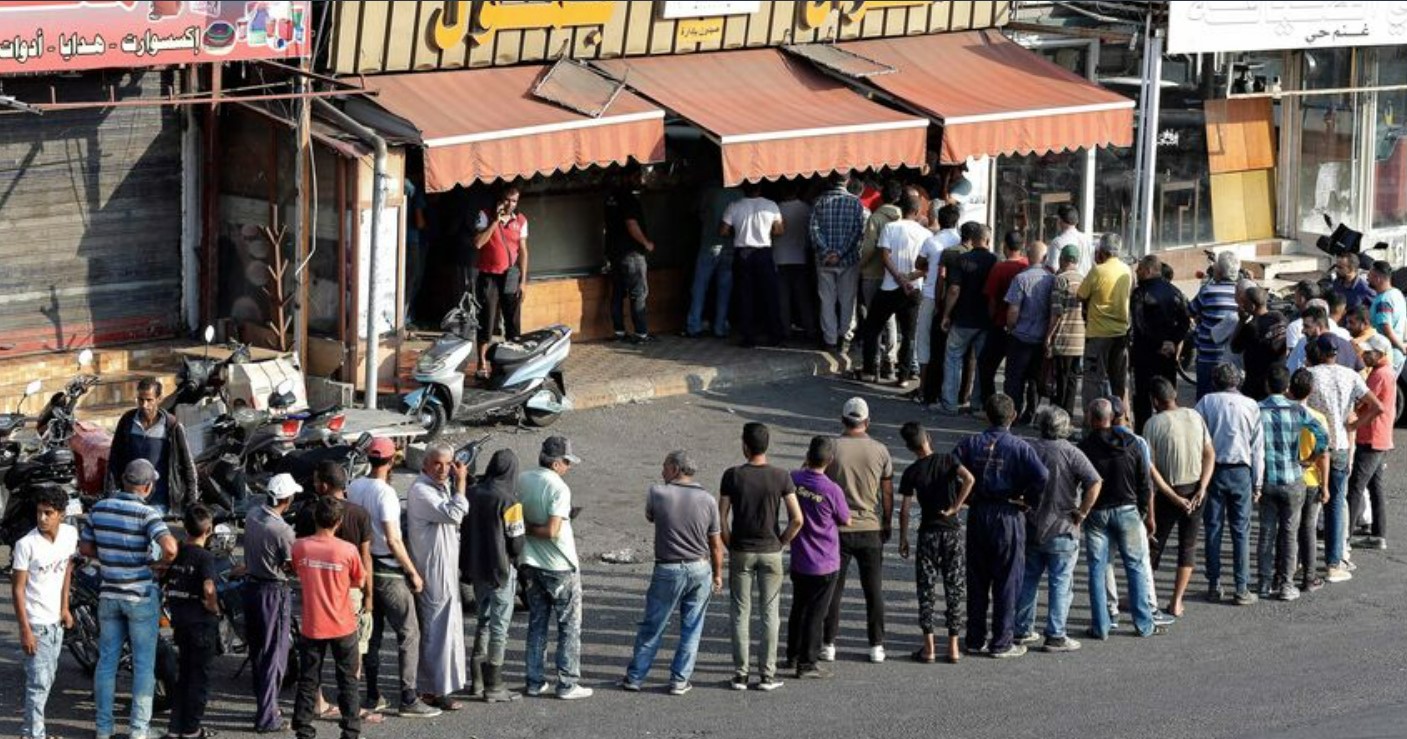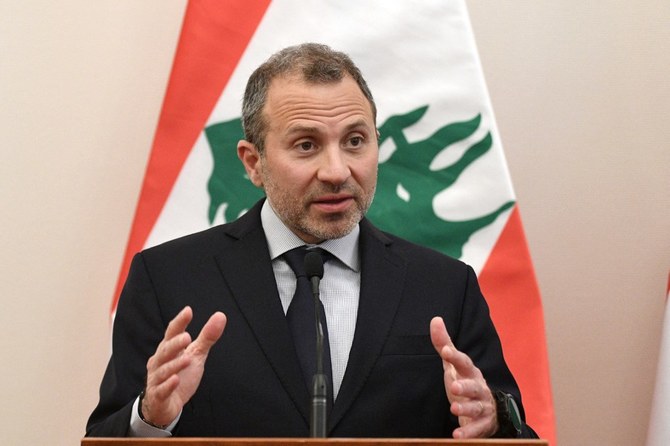
The views expressed in this article are the authors’ own and do not necessarily reflect khazen.org
By Nizar Ghanem Founder of the Depositor’s Union of Lebanon Alex Ray Analyst at the Beirut-based think tank Triangle - Today, Lebanon has an enormous $72bn hole in its national finances. That figure alone, by any measure of the law, maths or logic should mean that Lebanon’s banks are bankrupt. Yet since the onset of the financial crisis, Lebanon’s banks and their supposed regulator, the Banque du Liban (BDL), have been making a bizarre ontological argument to avoid paying back their depositors and officially declaring bankruptcy. Despite there being no official capital controls, more than 60 of the country’s commercial banks have adopted the policy that a US dollar is not really a US dollar if it was deposited into a Lebanese bank before the financial crisis. Instead, they claim, a pre-crisis dollar is equal to a Lebanese pound and can only be withdrawn at a severely reduced rate – some 90 percent less than the current value of an American dollar on the black market. But any US dollars deposited to these same banks after the financial crisis would be “fresh” dollars, and thus, they can be withdrawn or exchanged with another currency at their real value at any time. Lebanese banks are basically claiming that not all debts to depositors are created equal. Naturally, millions of Lebanese are not on board with this. After enduring this absurd policy for three long years, a few desperate depositors have taken matters into their own hands.
There are near-weekly bank hold-ups across Lebanon, but with a twist: People have been threatening to use violence in banks not to steal other people’s money, but to obtain access to their own savings. Some believe, however righteous the depositors’ anger may be, threatening violence is a step too far. But when you think about how these people have lost their homes or found themselves unable to meet their families’ most basic needs, including food, education and medical care, – simply because a bank is not giving them access to their own money – it becomes hard to compare these acts to “normal” bank robberies. In any country with a functioning social contract, the banking sector’s invented distinction between “fresh” and “old” money would have gone to court, and a sane judge would have ordered the bank to either pay up or declare bankruptcy – but not in Lebanon. In Lebanon, the judiciary is so scared to take on the banks – many of which are owned by political elites – that they are allowing the banks’ white-collar theft to continue, citing “exceptional circumstances”.

by Nada Atallah -- thenationalnews.com - Lebanon plans to drastically raise taxes to boost the cash-strapped state’s revenues, but experts fear that the Lebanese will not be able to pay the new rates after three years of economic collapse, which pushed more than three quarters of the population into poverty. Lebanon’s public revenue fell by half in 2021 as the country grappled with a financial meltdown described as one of the world's worst economic crises. The government currently generates taxes at the old pegged exchange rate, but Lebanon’s 2022 budget published on Tuesday introduced a new “effective rate" for taxes on salaries earned in dollars. Finance Minister Youssef Khalil confirmed to The National on Monday that the new rate for taxes will be set according to Sayrafa, the official exchange rate platform managed by the Central Bank, where the Lebanese pound is trading at about 30,000 to the dollar.
This is about 20 times higher than the current official rate. The local currency’s official rate had been set at 1,507 per dollar since 1997, before unravelling after the economic crisis unfolded in 2019. “This is a skyrocketing increase. The budget includes a 25 per cent tax for annual incomes above 675 million Lebanese pounds, which is only $16,875 per year”, tax lawyer Karim Daher said. The new rate for tax collection will be implemented once the Ministry of Finance and Central Bank issue a decree. Lebanon to raise exchange rate for taxes, fees and customs duties Legislators included higher tax brackets in the budget to alleviate the financial effect on taxpayers. But experts fear the adjustment is not enough for an impoverished population grappling with one of the highest inflation rates in the world.

سجعان قزي
انتهَت الـمُهلةُ الدُستوريّةُ لانتخابِ رئيسِ الجُمهوريّةِ اللبنانيّة، وبدأت الـمُهلةُ السياسيّةُ. الـمُهلةُ الأولى كانت مُحدَّدةً بشهرين، أما الأُخرى فمفتوحةٌ إلى ما شاءَ القَدَر. والقدرُ في لبنان هو التعبيرُ المرادِفُ لقِلّةِ الوطنيّةِ والمسؤوليّة. الـمُهلةُ الدُستوريّةُ كانت محصورةً ـــ مبدئيًّا ـــ بقرارِ الكتلِ النيابيّةِ: يَنتخِبون أو لا يَنتخبون رئيسًا صُنِع في لبنان. الـمُهلةُ السياسيّةُ تَستأثر بها، علاوةً على الأطرافِ الداخليّةِ، المحاورُ الإقليميّةُ والدُوَليّةُ، وتَرتَبطُ بأصغرِ حدثٍ في الـمِنطقةِ إلى أكبرِ صراعٍ دُوَليٍّ. اليومَ لبنان دولةٌ بلا دستور. يُدارُ مِزاجيًّا. هذه نهايةُ دولةٍ ما لم تُنقَذ سريعًا. وإذا كان الإنقاذُ متوافِرًا، المؤسفُ أن الحوارَ بين القوى اللبنانيّةِ الأساسيّةِ هو "أكذوبةٌ سياسيّة". الحوارُ إرادةٌ قبلَ أن يكونَ جدولَ أعمال. في لبنان الإرادةُ غائبةٌ وجدولُ الأعمال مُختلَفٌ عليه. منذ ثلاثةِ أيّامٍ (14 ت2)، بفضلِ إرادةِ الاتفاق، تَوَصّل الرئيسان الأميركيُّ والصينيُّ إلى معالجةِ أصعبِ المشاكلِ السياسيّةِ والعسكريّةِ والاقتصاديّةِ بينهما في ثلاثِ ساعات.
سابقًا كان يَتعذَّرُ تقسيمُ لبنان حتّى لـمّا كان "مُقسّمًا". اليومَ، صار يَصعُبُ توحيدُه حتى لو كان بعدُ "موحَّدًا". تَعذُّرُ التقسيمِ قديمًا كان بفَضلِ وجودِ مشروعٍ لبنانيٍّ واحدٍ وحياةٍ لبنانيّةٍ واحدةٍ تُؤالِفُ بين جميعِ الطوائف ولو مع مطالباتٍ بتعديلاتٍ دستوريّة (الطائف). أما صعوبةُ توحيدِ لبنان اليومَ فبِسببِ نموِّ مشاريعَ غيرِ لبنانيّةٍ وانتشارِ نَمطِ حياةٍ غيرِ لبنانيٍّ حتى داخلَ كلِّ طائفة. افترق الإنسانُ ولو بَقيت الأرضُ 10452 كلم². الإشكاليّةُ الآن كيف نُحافظُ على وِحدةِ لبنان الكيانيّةِ مع إعادة التقسيماتِ المناطقيّةِ في إطارِ لامركزيّةٍ موسَّعةٍ. لا يُجدي التَعنّتُ والتَنكُّرُ للتحوّلاتِ التي طرأت على البُنيةِ البشريّةِ والمجتمعيّة اللبنانيّة. في حياةِ الأممِ تَنتهي مراحلُ لتبدأَ أخرى جديدة، ومختلفةٌ أحيانًا. بين 1798 و1958 غَيّرت فرنسا ستّةَ عشرَ نظامًا بين ملكيٍّ وإمبراطوريٍّ وجُمهوريّ. وكان أبرزُها الملَكيّةَ المطلَقة والملكيّاتِ الدُستوريّةَ والإمبراطوريّاتِ، فالجُمهورياتِ الأولى والثانية والثالثة والرابعة والخامسة مع الجنرال شارل ديغول سنة 1958. كانت التغييراتُ الدُستوريّةُ حاجةً أدّت إلى تَقدّمِ فرنسا ولو بالأوجاعِ والدماء.

PARIS, (Reuters) By John Irish --- Senior Lebanese politician Gebran Bassil said on Thursday he was working to find a compromise candidate for the presidency who would be able to push through crucial reforms, but that he would run for the post himself if he deemed a chosen candidate a bad option. Lebanon has had neither a head of state nor a fully empowered Cabinet since Michel Aoun's term as president ended on Oct. 31 - an unprecedented vacuum even by the standards of a country that has enjoyed little stability since independence. The vacuum marks a new phase in the crisis that has hit Lebanon since its financial system collapsed in 2019, impoverishing a large swath of people, paralysing banks and fuelling the biggest wave of emigration since the 1975-1990 civil war.
The presidential post is reserved for Christians, but part of the standoff reflects rivalries among the community as well as crucial political and religious balances in the country. "I am the head of the biggest parliamentarian bloc and it is my total right to be the candidate and promote myself but I see that the existence of Lebanon is much more important than this and it's now the existence of Lebanon that is at stake," Bassil, a Maronite Christian, who is one Lebanon's most influential politicians, told Reuters in an interview. "I took the decision not to present myself in order to avoid the vacancy and facilitate the process of ensuring a good profile with a high possibility of success. I did not do this to have the vacancy and a bad person to fill the void," he said. "I will not accept to have a bad president and in that case of course I would run." With politicians showing no compromise in a tussle over state power, some political sources and analysts say a compromise on the presidency may demand the type of foreign mediation that has saved Lebanon from such standoffs previously.
Khazen History


Historical Feature:
Churches and Monasteries of the Khazen family

St. Anthony of Padua Church in Ballouneh
Mar Abda Church in Bakaatit Kanaan
Saint Michael Church in Bkaatouta
Saint Therese Church in Qolayaat
Saint Simeon Stylites (مار سمعان العامودي) Church In Ajaltoun
Virgin Mary Church (سيدة المعونات) in Sheilé
Assumption of Mary Church in Ballouneh
1 - The sword of the Maronite Prince
2 - LES KHAZEN CONSULS DE FRANCE
3 - LES MARONITES & LES KHAZEN
4 - LES MAAN & LES KHAZEN
5 - ORIGINE DE LA FAMILLE
Population Movements to Keserwan - The Khazens and The Maans
ما جاء عن الثورة في المقاطعة الكسروانية
ثورة أهالي كسروان على المشايخ الخوازنة وأسبابها
Origins of the "Prince of Maronite" Title
Growing diversity: the Khazin sheiks and the clergy in the first decades of the 18th century
Historical Members:
Barbar Beik El Khazen [English]
Patriach Toubia Kaiss El Khazen(Biography & Life Part1 Part2) (Arabic)
Patriach Youssef Dargham El Khazen (Cont'd)
Cheikh Bishara Jafal El Khazen
Patriarch Youssef Raji El Khazen
The Martyrs Cheikh Philippe & Cheikh Farid El Khazen
Cheikh Nawfal El Khazen (Consul De France)
Cheikh Hossun El Khazen (Consul De France)
Cheikh Abou-Nawfal El Khazen (Consul De France)
Cheikh Francis Abee Nader & his son Yousef
Cheikh Abou-Kanso El Khazen (Consul De France)
Cheikh Abou Nader El Khazen
Cheikh Chafic El Khazen
Cheikh Keserwan El Khazen
Cheikh Serhal El Khazen [English]
Cheikh Rafiq El Khazen [English]
Cheikh Hanna El Khazen
Cheikha Arzi El Khazen
Marie El Khazen